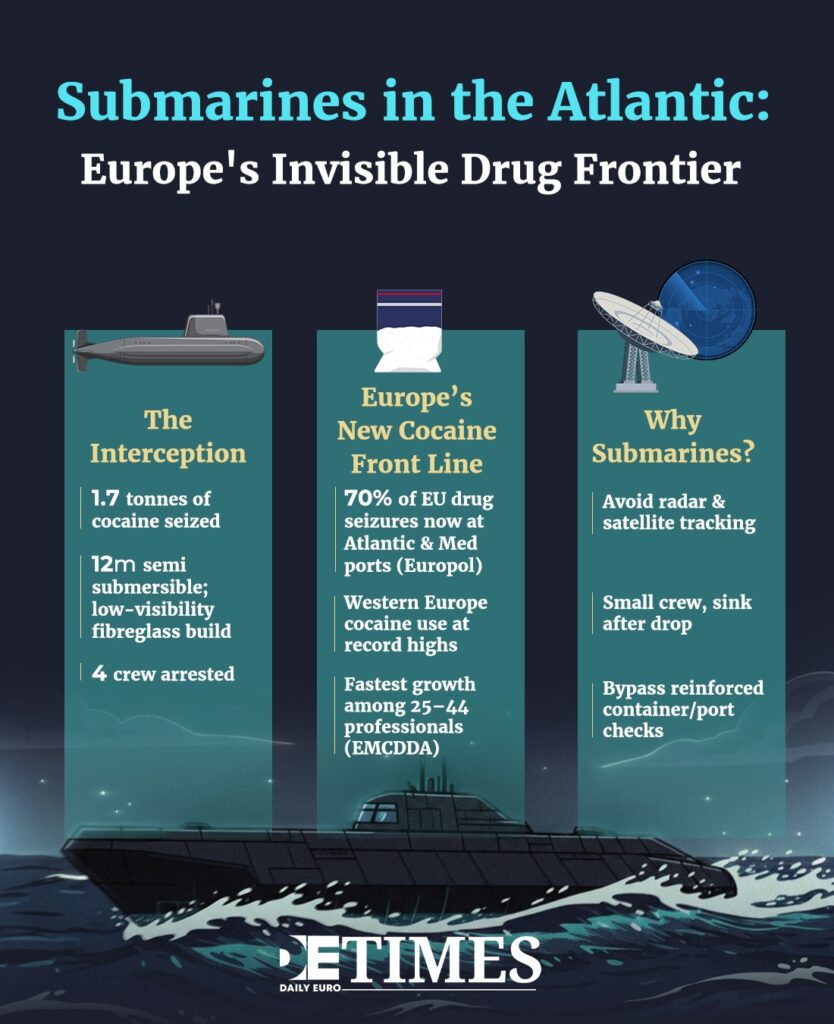Portugal’s navy and judicial police announced in March the interception of a narco-submarine carrying 1.7 tonnes of cocaine believed to be bound for the Iberian Peninsula.
The semi-submersible vessel, likely departing from Latin America, was detected off the Atlantic coast after a joint operation with Spanish and international intelligence agencies.
Four crew members were arrested, and investigators believe the shipment was destined for networks with established ties to South American cartels. The craft itself, a 12-metre fibreglass vessel with minimal visibility, mirrors designs used in previous interceptions near Vigo in 2019 and the Canary Islands in 2023.
Authorities described the find as a warning sign that trafficking routes are adapting to Europe’s maritime geography.
Europe’s Expanding Front Line
For years, cocaine trafficking followed predictable paths: container ports, overland transport, and clandestine airstrips. But as customs controls and satellite tracking improved, smugglers turned to older, riskier methods. Semi-submersibles allow small crews to cross the Atlantic largely undetected, often sinking after delivery.
Portugal's long coastline, its position on transatlantic shipping routes, and proximity to Spain's Galicia make it an increasingly strategic entry point. Europol data shows that 70 percent of drug seizures in Europe now occur at Atlantic or Mediterranean ports.
The seizure also underscores a subtle shift: Europe is no longer merely a destination for narcotics. It is now an active arena in the logistics of global trafficking, from finance to distribution.

Beyond the War on Drugs
What emerges from these operations is not a new story of law enforcement victory, but a recurring lesson in global economics. The cocaine trade thrives on demand, not geography. Every interception, however dramatic, reveals how vast and adaptive the networks have become.
Portugal, which decriminalised drug possession in 2001, treats consumption as a public health issue rather than a criminal one. But trafficking remains under heavy prosecution. The contrast illustrates Europe’s dual challenge: balancing compassion for users with pressure against transnational networks.
The European Monitoring Centre for Drugs and Drug Addiction notes that cocaine use in Western Europe has reached record highs, particularly among professionals aged 25 to 44. The black market follows those numbers closely.
The Geography of Opportunity
Atlantic narco-routes mirror historical trade routes, connecting the same continents that once exchanged sugar, coffee, and silver. The difference today is the nature of the goods and the invisibility of the trade.
In Lisbon, analysts have warned that Portugal’s standing as a logistics hub also makes it vulnerable. The same maritime infrastructure that moves Europe’s energy and goods can conceal shipments of high-value contraband.
The European Commission has called for a joint maritime monitoring system linking customs, coast guards, and port authorities. Yet resources remain uneven: smaller states like Portugal or Malta carry a disproportionate share of the risk without the scale of northern European enforcement budgets.
A Modern Paradox
The irony is that these submarines, built in jungles and hidden coves, embody the global sophistication they seek to evade. They are products of engineering, finance, and demand — all features of the modern world.
Every seizure makes headlines, yet few address the underlying equation: that so long as the market exists, supply will find a way. Portugal’s interception this year was a triumph of coordination and vigilance. But it is also a reminder that globalisation’s darker side moves through the same seas as trade and tourism.
The real front line is not on the water but within the economies and societies that keep this commerce profitable.
Keep up with Daily Euro Times for more updates!
Read also:
West Africa’s New Cocaine Highway: Europe’s Venezuelan Moment?
Europe’s Fragile Outpost: Unrest and Security Challenges in French Guiana
Britain Closes Its Doors, Portugal Follows: The New Face of European Refugee Policy






